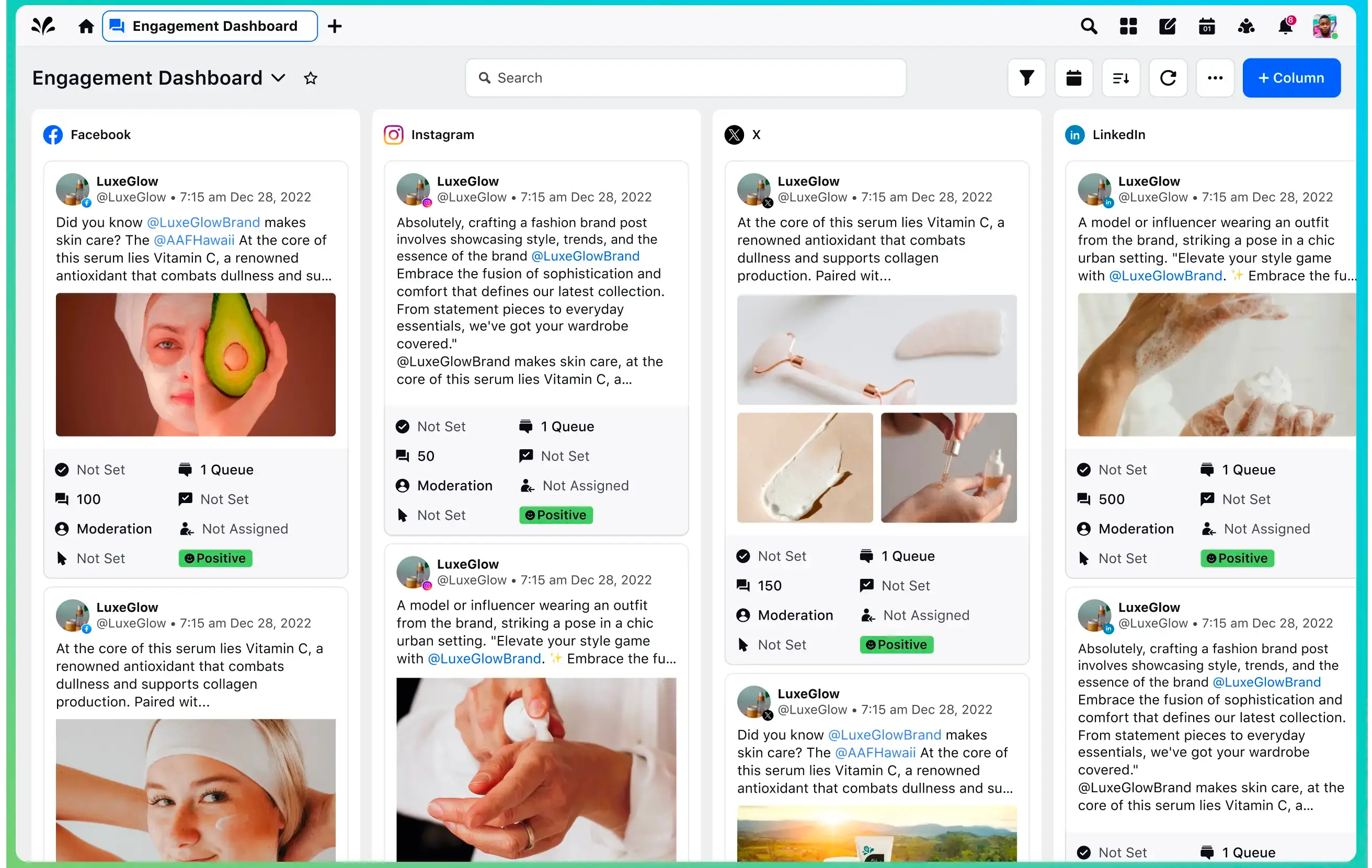The undisputed leader in social media management
For over a decade, the world’s largest enterprises have trusted Sprinklr Social for its in-depth listening, unmatched channel coverage, enterprise-grade configurability and industry-defining AI.

How to Respond to Customers on Social Media (+ Examples)
Ever since the pandemic, social media has firmly cemented its place as a powerful platform for businesses to connect with customers. With millions of people actively using social media every day, it has become a key channel for brands to build relationships, address concerns and showcase their customer-centric approach.
Why, as of October 2023, the global social media user base reached a whopping 4.95 billion. When you break these figures down, it equates to 10 billion hours being devoted to social media every single day. Baffling, isn't it?
With such astonishing numbers and so many keen, potential customers, it would be insane to not make the most of this cyber ocean for your brand. And there's one thing that reigns supreme when it comes to making the most of social media, responding to customers swiftly.
In this article, we've jotted down some best practices for responding to customers on social media along with relevant, real-world examples. Let's get right into it then.
Why should you respond to customers on social media
In a world where social media is easily accessible and used by pretty much everyone, living means being constantly interconnected via the Web. The traditional 9-5 work schedule has become a thing of the past, as social media has transformed business communication into a round-the-clock commitment.
Social media platforms offer customers a convenient and immediate way to communicate with brands. By leveraging power of social listening businesses can stay vigilant and promptly respond to customers who mention their brand on social media channels, like X and Instagram. Whether customers are praising a product, seeking assistance or expressing dissatisfaction, responding promptly and professionally to them has become the norm.
To give you a better idea, here are a few reasons why responding to customers on social media is essential for your brand.
Build trust and loyalty
Responding to customers' queries and feedback on social media helps build loyalty and trust.
When a customer has a positive experience with your company, one of their initial reactions is often to express their satisfaction by writing a positive online review. On the flip side, if a customer has a negative experience with your company, they're more likely to share their discontent through a brutal negative review. Such unfavorable reviews can potentially portray your brand as one that prioritizes profit over customer care, which will undermine its reputation overnight.
Brands should genuinely care about their customers and value their opinions. Why? Because it encourages customers to stay loyal and true to you, along with helping you develop a positive brand image.
Enhance customer satisfaction
Timely and thoughtful responses to customer inquiries on social media demonstrate that your brand is committed to providing excellent customer service. And with higher customer satisfaction, they are more likely to recommend your brand to others and become life-long patrons.
Turn negative feedback into opportunities
Social media is an open platform filled with people from all walks of life, and, sometimes, it's certainly possible that negative feedback might crop up. If and when it does, responding promptly and professionally to customers' frustrations and comments gives you an opportunity. An opportunity to address the issue, showcase your problem-solving abilities and turn disgruntled customers into satisfied ones. Way to turn the tide, huh?
Related Read: 5 Ways of Responding to Customer Complaints [+ Real Examples]
Do's and don'ts for engaging with customers on social media
When used and managed effectively, social media has the potential to elevate your business by building brand awareness, driving website traffic, expanding your customer base and boosting revenue. However, in today's competitive landscape, marketers are increasingly searching for the ideal strategy that will distinguish their social media accounts from the rest.
📶How does your social customer care stack up against the competition?
Just analyzing your support performance isn’t enough. You need to know how your performance compares against industry standards and if there’s scope for improvement.
To this end, we went ahead and evaluated 13K top-performing brands across 6 industries to see the benchmarks they have set for social care.
- Technology
- Entertainment & Media
- Financial Services
- Food & Beverage
- Health & Pharma
- Retail
Since accuracy is a priority, we used Sprinklr’s AI to analyze more than 2B inbound and outbound messages and 27B social media engagements.
The best part?
All our key findings and industry-specific benchmarks are available to you in a crisp SOCIAL BENCHMARKING REPORT, on the house. Go ahead, download it now and stay ahead in the race!
To help you make the most of your social media company profiles and avoid common pitfalls, here's a list of the do's and don'ts of engaging with customers on social media.
Do's
- Respond promptly: Acknowledge customer inquiries or feedback as quickly as you can, ideally within a few hours. Swift responses show that the brand values its customers' time and concerns. With social media engagement services, businesses can respond swiftly to customer queries, ensuring that every customer feels valued and heard. You can also employ automated routing and conversation tagging to streamline your responses.
❗Automated routing ensures every customer query finds its way to the right ears.
Picture a system that sorts through the noise, pinpointing conversations that need your attention and directing them to the right service agent, swiftly and seamlessly, ensuring first contact resolution. Bingo!
- Be empathetic and understanding: Understand the customer's perspective and show empathy when addressing their queries or issues. Use a friendly and conversational tone to make the interaction more personal. Through sentiment analysis, businesses can identify customer sentiment and craft responses that show empathy and address concerns effectively.
Quick Takeaway: You can nail sentiment analysis by doing a quick sentiment sorting. You can categorize feedback vibes into three easy buckets:
Positive | excellent, love, kudos, fantastic, perfect, appreciate |
Negative | terrible, hate, disappointing, awful, poor, avoid |
Neutral | acceptable, average, okay, moderate, satisfactory, ordinary |
- Personalize responses: Address customers by their names and tailor responses to their specific queries. Personalization helps create a stronger connection and makes customers feel valued.
 The Human Touch: How personalised experiences can drive business growthlearn more
The Human Touch: How personalised experiences can drive business growthlearn more - Show appreciation: Always thank customers for their feedback, positive reviews or even criticisms. Expressing gratitude demonstrates humility and appreciation for their engagement with the brand.
💡 Pro Tip: Implementing these practices becomes a breeze with Sprinklr's cutting-edge Social Customer Service Software. From managing quick responses to engaging proactively and gathering feedback efficiently, this platform is your command center.
Ready to up your social care game? Explore Sprinklr and see the difference it can make for your team and your customers.book a demo
Don'ts
- Avoid too many automated responses: While automation can be helpful for some routine tasks, avoid using fully automated responses for all customer inquiries. Personalized and human responses are more genuine and relatable.
- Don't ignore negative comments: Ignoring negative comments or feedback can worsen the situation. Instead, address the concerns with a positive attitude and a willingness to find a solution.
- Avoid using jargon or technical language: Communicate with clear and simple language that's easily understandable by all customers. Avoid using industry jargon or technical terms that might confuse or distance customers.
- Don't engage in public arguments: If a customer becomes confrontational, avoid getting into a public argument. Stay calm and professional and consider taking the conversation to direct messages or private channels.
Point to note: Social customer service is famed to be 24/7, non-stop, but your support agents need their downtime. To address out-of-hours queries, take the help of generative AI chatbots that can mimic human agents and moderate their tone without missing a beat. Curious to learn more? Register for a free demo today.
Maintaining authenticity and transparency on social media while nurturing genuine connections with your followers is crucial. By doing this, your brand will become more trustworthy and credible, leading to increased success for your business in the long run.
A content marketing platform can work wonders for your business when it comes to maintaining a consistent tone and voice in your response, which will, in turn, reinforce your brand identity.
Also Read: How To Turn Your Customers Into A Community Of Brand Advocates
How to craft the perfect response for customers
Back in 2015, X reported a remarkable 2.5x increase in the number of posts that were directed at the customer service handles of top brands. So, you can only imagine how much that number would've skyrocketed almost a decade later.
While you might have a skilled and experienced customer service team that's proficient in handling emails and calls, communicating with customers on social channels presents a unique challenge.
To empower you in handling those tricky situations, here are some customer service scripts that your agents can draw inspiration from while addressing customer inquiries.
1. Responding to positive feedback
Customer: "Brand XYZ, I just received my order, and I'm thrilled with the quality! Thanks!"
Ideal response: "Thank you so much for your kind words! We're thrilled to hear that you loved your order. Your satisfaction is our top priority, and we look forward to serving you again soon!"
2. Addressing a customer complaint
Customer: "Brand XYZ, my order arrived with a missing item! This is so disappointing!"
Ideal response: "We apologize for the inconvenience. Please accept our sincere apologies for the oversight. Our team will reach out to you immediately to resolve this issue and ensure you receive the missing item. Thank you for bringing this to our attention!"
3. Handling a complex inquiry
Customer: "Brand XYZ, I'm interested in your new product, but I'm not sure if it's compatible with my current setup. Can you help?"
Ideal response: "Of course! We'd be happy to assist. Please DM us with more details about your current setup, and our tech experts will provide you with all the information you need. Looking forward to helping you make the right choice!"
4. Dealing with impatient customers
Customer: "Brand XYZ, I'm interested in your new product, but I'm not sure if it's compatible with my current setup. Can you help?"
Ideal response: "We apologize for the delay. Our team is currently experiencing a high volume of inquiries, but we're doing our best to get back to everyone as quickly as possible. Your patience is greatly appreciated!"
5. Responding to negative feedback
Customer: "Brand XYZ, your product didn't live up to my expectations. Waste of money!"
Ideal response: "We're sorry to hear about your experience. Your satisfaction is essential to us, and we'd like to make it right. Please DM us with more details about the issue, and our customer support team will work with you to find a resolution."
6. Handling a viral complaint
Customer: "I recorded this video to show you how this product is malfunctioning terribly. Can't believe this happened! Avoid Brand XYZ's product at all costs!"
Ideal response: "We're deeply sorry to see this. This is not the experience we want any of our customers to have. Safety and quality are paramount to us and we'll investigate this matter thoroughly to prevent it from happening again. Please DM us so we can further discuss this issue and assist you."
7. When customers share suggestions
Customer: "Brand XYZ, your latest update is great, but it would be awesome if you could add a dark mode option!"
Ideal response: "We warmly welcome your suggestions and fresh product ideas, which you can kindly submit through our website. To get started, simply visit our website and navigate to the Contact Us section. Scroll down to find the Email Us option, where you'll discover a designated tab labeled Suggestion or Idea. Feel free to share your valuable input with us there."
That's a wrap
All in all, responding to customers on social media is not just a business obligation but an opportunity to build strong connections and create loyal brand advocates. Engaging with customers in a timely, empathetic and personalized manner can foster trust, enhance customer satisfaction and turn negative situations into positive outcomes.
Remember, every interaction on social media is an opportunity to showcase your brand's commitment to customer satisfaction. By being consistent with your responses, you can turn social media interactions into valuable moments that leave a lasting positive impression on your customers.
Try Sprinklr Social today and see how it can take your social media customer engagement to the next level.




